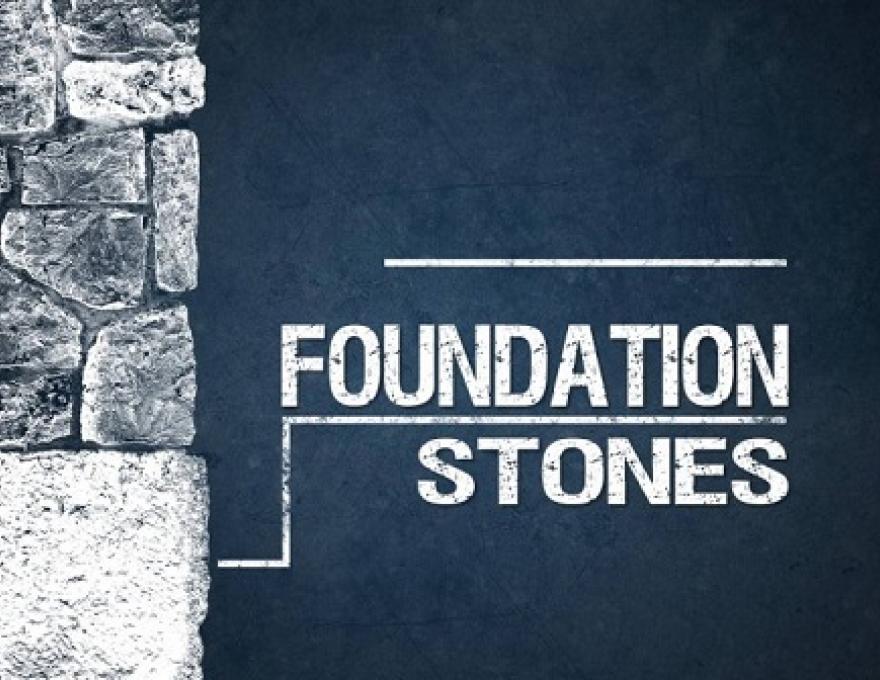And Why I Believe That Matters
Those of us who have been grounded in a solid teaching on creation, along with all the wonderful scientific evidence that backs it up, tend to consider a literal interpretation of Genesis as foundational to faith. I mean, if we didn't believe in a literal Adam and Eve, some major chunks of scripture--New Testament included--would have to be juggled and twisted a bit to make them fit, right? However, I propose here that we keep our actual foundation stones down to a bare minimum leaving only two solid boulders that cannot fail. I propose teaching our kids all about creation science and the research behind it, while at the same time making it clear that this is not part of the foundation itself. Here's why.
I became a Christian in high school but had grown up in a liberal denomination and felt alone in my new experience of faith until I arrived at college. The public school I attended, like most others, taught evolution as a given, not a theory, and so I came to Auburn University never having run into an intellectual-type Christian who believed in a literal Adam and Eve, much less, Noah, Tower of Babel, etc. (This was 1968 and Henry Morris’ ground-breaking book The Genesis Flood had only recently been published.) I thought every Christian must somehow meld their beliefs around evolution. Then my sophomore year I ran into a girl who believed in the creation story of Genesis and admitted outright that she did not believe in evolution. I was stunned to find out she was a biology major. In truth, I felt a little sorry for her because her ideas seemed so anti-intellectual, but our brief encounter became like a pebble in my shoe that I couldn’t quite ignore.
Lightning Bolts
My worldview didn’t change, however, until the fall of 1970 when I attended a weekend retreat hosted by Campus Crusade for Christ (now CRU) and heard speaker Jody Dillow present a scientific framework for a literal creation week and even--I couldn’t believe it--a young earth! Lightning bolts hit my brain. Everything Jody explained made sense. You can probably understand my excitement as I came to realize that I just might be able to truly believe the whole--WHOLE--Bible after all...and without having to check my brains at the door.
From that p oint on I began soaking in everything I could find on the subject of scientific creationism and 15 years later was hosting seminars at my church using videos from Answers in Genesis. Meanwhile, I was homeschooling three delightful and curious kids who were, I thought, absorbing the creation-based science books we used, and listening to me, the guru mom. I was certain they were getting the science they needed to combat the evolutionary suppositions of our secular world and of any secular college they might attend.
oint on I began soaking in everything I could find on the subject of scientific creationism and 15 years later was hosting seminars at my church using videos from Answers in Genesis. Meanwhile, I was homeschooling three delightful and curious kids who were, I thought, absorbing the creation-based science books we used, and listening to me, the guru mom. I was certain they were getting the science they needed to combat the evolutionary suppositions of our secular world and of any secular college they might attend.
A Second Bolt
Then another lightning bolt hit by way of my son Robert. He came home from Georgia Tech one weekend and told me he was “having doubts.” I could tell he was troubled. As we talked, he told me that some of what was being presented in his science classes seemed to be insurmountable evidence for evolution. I began pulling articles for him to read and looking in my multitude of creation science materials for specific answers to address his questions. Then, he stopped me and said, “No, mom, you don’t understand. The holes I’m seeing in the creation story are causing me to doubt everything.”
As we talked further, it became clear that he had other questions too, not just questions about creation, so there were other cracks in the dam. But the cracks all radiated out from a central hole relating to science, and the ramrod was evolution.
Because of my experience with my son, I now have some suggestions that I believe will help to college-proof your child’s faith, things I wish I had nailed down more solidly with my own tribe.
Just Two Things
There are only two things that are truly central which, if proved to be untrue, would sink our beliefs: If Jesus didn’t die and if he didn’t rise. Period. That’s it. Not young earth, not inerrancy, not you-name-it. Basically nothing outside of the Apostle’s Creed is intrinsically essential. All else is peripheral--in vastly varying degrees, for sure. But still peripheral.
Peripheral issues may certainly build your faith. I felt that mine was catapulted forward that weekend I heard Jody Dillow speak. But though these matters edify, they are not essence, and your faith doesn’t fall apart if you suddenly discover things that shake your belief in something you were trained to see as peripheral. Overall then, your faith rests on a smaller, but much sturdier and vastly more incontestable foundation.
When a student understands that some things may be very important but still be technically and comparatively peripheral, he or she has the freedom to research and question, to investigate, and to know that their faith may change shape somewhat, but it is not going to suddenly implode because of something they discover. And YOU don’t have to worry that your child will lose his or her faith when surrounded and confronted by an onslaught of secular, atheistic ideas in college or the media.
We aren’t saved by our belief in Adam. We aren’t saved by our belief in an inerrant Bible, though it transmits the knowledge of Jesus to us. We are saved by Christ alone: his death, his resurrection.
The Centrality of the Resurrection
The resurrection is the event that proves Jesus was who he says he was, so all we have to do then is offer convincing confirmation that the resurrection actually happened in order to basically “prove” Christianity. Thankfully, the manuscript evidence alone is monumental, from clear historical indications that very little tampering with the manuscripts occurred in the early church to the fact that we have so many documents written within a few decades of the actual events that agree on all (all!) significant points. Then when you take into account the change in the behavior and beliefs of the followers after the event, you have what any historian dreams of--significant weight for one conclusion and one conclusion only--Jesus really did rise from the dead. And I’m just touching on the basics here--so much more could be said and, indeed, is easy to find on the internet.
The resurrection is the grand central station of faith. We need to help our children understand that the clearest, most expansive evidence for Christianity is found in that empty tomb. As Paul says in I Corinthians 15, "And if Christ has not been raised, then our preaching is in vain and your faith is in vain." Everything truly hangs on the authenticity of this event. And nothing else matters to the same degree.
Creationism and Moon Landings
Ken Ham of Answers in Genesis, one of my favorite YEC proponents, wants to evangelize with the message of scientific creationism. I love Ken Ham, but I disagree. Though creationism does indeed build up believers in their faith, it can actually be a huge stumbling block to non-believers, or to college students who need the freedom to question it. When a literal interpretation of Genesis is held up as part and parcel of orthodox faith, some will turn away simply because that is a roadblock they cannot even conceive of getting through. Do not put up such roadblocks to non-believers! Christians on the whole do not realize the extent to which they appear uneducated, even stupid, to outsiders when they espouse a literal Genesis. To them we sound like those folks who think the moon landings were all faked. Except for unusual circumstances, that is simply not a good place to begin making an argument for Christianity, nor is it a sturdy foundation stone for your children’s beliefs. A powerful building block--yes! Teach it rigorously--yes! Just don’t put it in the foundation.
If your children get a clear grip on what the true “deal breakers” are for Christianity, they will have a faith that is secure from whatever our secular sciences throw their way. They will sense a freedom to investigate and research honestly on their own the key questions concerning creation and evolution, as well as other theological issues, and all without putting their central beliefs in jeopardy.
And what is just as important, you will have the confidence to let them. When we parents react with fear when our kids want to delve into investigating faith, we are worried because we know that Satan can use the thinking of smart atheist teachers and authors to throw them into doubting God. But when our kids see our fear, it can easily appear to them as if we aren’t sure our faith will hold up under scrutiny! Isn’t it better to delight in their curiosity and encourage honest research? Isn’t it better to communicate confidence in the reliability of our beliefs? To say, “Wow! I love that you’re asking such thoughtful questions.”
So What Happened to Robert?
When I realized the seriousness of what was happening in my son’s studies and in his thinking, I began to search for notable Christians who were not young earth creationists like me. I found a few websites and started sending him links. I discovered Francis Collins and passed his book along. Meanwhile Robert began his own trek into the same things along with general apologetics. It wasn’t long before he discovered William Lane Craig who probably was the single most influential person on his thinking at that time. Craig is one of the leading apologists of our day and just happens to be amenable to a looser interpretation of Genesis. Craig also has the most incredible You Tube videos I have found anywhere on the reliability of the New Testament documents and the historicity of the resurrection. Those were the clincher.
So Robert is doing fine now and sending me tomes by N.T. Wright to read so we can talk about them. He is still undecided on how God brought it all about--but he knows it was God! He has an active faith built on a clear foundation of two enormous boulders: Jesus died; Jesus rose. Many, many more things matter deeply, many more concepts enliven us and carry us through, many more truths free us, but only those two are essential to belief that Jesus is who he claimed to be. Only these two are complete deal-breakers if they are false. All the rest of our beliefs are secured in and through these, not the other way around.
I remain an avid young earther, but I am now ready with quality links and books for those seekers who first need reassurance that a literal Genesis is not a prerequisite to knowing Christ. Of course, I’m ready with the creation science links too for those who are even the least bit open and interested. Opening people's eyes to young earth creationism is still one of my favorite conversations!
Resources
A few well-known Christians who are not YEC―
These people would either be old earth creationists (Adam was a real man but he came along millions of years ago), or theistic evolutionists (God created but he did so over a long period of time using and directing an evolutionary process).
Tim Keller--His paper addressing the topic
C.S. Lewis
William Lane Craig, one of today’s foremost apologists
Nancy Pearcey
Chuck Colson
Lee Strobel
Kenneth Taylor
Scot McKnight
more
A few well-known scientists who are both Christians and evolutionists are listed here. And below are 2 people and a website worth knowing about:
● Francis Collins (head of the Human Genome Project), author of The Language of God: A Scientist Presents Evidence for Belief. Collins is a brilliant scientist who believes God used the evolutionary process to bring about His creation. This particular book includes his testimony.
● Michael Behe, author of Darwin’s Black Box, a truly amazing book that completely slams the atheist notion that there is no intelligent design behind it all, although he remains on the evolution side of the playing field. Behe’s book--reviewed by Answers in Genesis
● Biologos website: In their words, “BioLogos invites the church and the world to see the harmony between science and biblical faith as we present an evolutionary understanding of God’s creation.”
Laurie White is an author, teacher, and mom to three kids who were homeschooled k-12. She writes books and other supplemental materials for homeschoolers including her popular and award-winning King Alfred’s English which combines history and English in a highly entertaining format for grades 7 and above. For more info and access to Laurie's free downloads go to www.TheShorterWord.com
Those of us who have been grounded in a solid teaching on creation, along with all the wonderful scientific evidence that backs it up, tend to consider a literal interpretation of Genesis as foundational to faith. I mean, if we didn't believe in a literal Adam and Eve, some major chunks of scripture--New Testament included--would have to be juggled and twisted a bit to make them fit, right? However, I propose here that we keep our actual foundation stones down to a bare minimum leaving only two solid boulders that cannot fail. I propose teaching our kids all about creation science and the research behind it, while at the same time making it clear that this is not part of the foundation itself. Here's why.
I became a Christian in high school but had grown up in a liberal denomination and felt alone in my new experience of faith until I arrived at college. The public school I attended, like most others, taught evolution as a given, not a theory, and so I came to Auburn University never having run into an intellectual-type Christian who believed in a literal Adam and Eve, much less, Noah, Tower of Babel, etc. (This was 1968 and Henry Morris’ ground-breaking book The Genesis Flood had only recently been published.) I thought every Christian must somehow meld their beliefs around evolution. Then my sophomore year I ran into a girl who believed in the creation story of Genesis and admitted outright that she did not believe in evolution. I was stunned to find out she was a biology major. In truth, I felt a little sorry for her because her ideas seemed so anti-intellectual, but our brief encounter became like a pebble in my shoe that I couldn’t quite ignore.
Lightning Bolts
My worldview didn’t change, however, until the fall of 1970 when I attended a weekend retreat hosted by Campus Crusade for Christ (now CRU) and heard speaker Jody Dillow present a scientific framework for a literal creation week and even--I couldn’t believe it--a young earth! Lightning bolts hit my brain. Everything Jody explained made sense. You can probably understand my excitement as I came to realize that I just might be able to truly believe the whole--WHOLE--Bible after all...and without having to check my brains at the door.
From that p
 oint on I began soaking in everything I could find on the subject of scientific creationism and 15 years later was hosting seminars at my church using videos from Answers in Genesis. Meanwhile, I was homeschooling three delightful and curious kids who were, I thought, absorbing the creation-based science books we used, and listening to me, the guru mom. I was certain they were getting the science they needed to combat the evolutionary suppositions of our secular world and of any secular college they might attend.
oint on I began soaking in everything I could find on the subject of scientific creationism and 15 years later was hosting seminars at my church using videos from Answers in Genesis. Meanwhile, I was homeschooling three delightful and curious kids who were, I thought, absorbing the creation-based science books we used, and listening to me, the guru mom. I was certain they were getting the science they needed to combat the evolutionary suppositions of our secular world and of any secular college they might attend.A Second Bolt
Then another lightning bolt hit by way of my son Robert. He came home from Georgia Tech one weekend and told me he was “having doubts.” I could tell he was troubled. As we talked, he told me that some of what was being presented in his science classes seemed to be insurmountable evidence for evolution. I began pulling articles for him to read and looking in my multitude of creation science materials for specific answers to address his questions. Then, he stopped me and said, “No, mom, you don’t understand. The holes I’m seeing in the creation story are causing me to doubt everything.”
As we talked further, it became clear that he had other questions too, not just questions about creation, so there were other cracks in the dam. But the cracks all radiated out from a central hole relating to science, and the ramrod was evolution.
Because of my experience with my son, I now have some suggestions that I believe will help to college-proof your child’s faith, things I wish I had nailed down more solidly with my own tribe.
Just Two Things
There are only two things that are truly central which, if proved to be untrue, would sink our beliefs: If Jesus didn’t die and if he didn’t rise. Period. That’s it. Not young earth, not inerrancy, not you-name-it. Basically nothing outside of the Apostle’s Creed is intrinsically essential. All else is peripheral--in vastly varying degrees, for sure. But still peripheral.
Peripheral issues may certainly build your faith. I felt that mine was catapulted forward that weekend I heard Jody Dillow speak. But though these matters edify, they are not essence, and your faith doesn’t fall apart if you suddenly discover things that shake your belief in something you were trained to see as peripheral. Overall then, your faith rests on a smaller, but much sturdier and vastly more incontestable foundation.
When a student understands that some things may be very important but still be technically and comparatively peripheral, he or she has the freedom to research and question, to investigate, and to know that their faith may change shape somewhat, but it is not going to suddenly implode because of something they discover. And YOU don’t have to worry that your child will lose his or her faith when surrounded and confronted by an onslaught of secular, atheistic ideas in college or the media.
We aren’t saved by our belief in Adam. We aren’t saved by our belief in an inerrant Bible, though it transmits the knowledge of Jesus to us. We are saved by Christ alone: his death, his resurrection.
The Centrality of the Resurrection
The resurrection is the event that proves Jesus was who he says he was, so all we have to do then is offer convincing confirmation that the resurrection actually happened in order to basically “prove” Christianity. Thankfully, the manuscript evidence alone is monumental, from clear historical indications that very little tampering with the manuscripts occurred in the early church to the fact that we have so many documents written within a few decades of the actual events that agree on all (all!) significant points. Then when you take into account the change in the behavior and beliefs of the followers after the event, you have what any historian dreams of--significant weight for one conclusion and one conclusion only--Jesus really did rise from the dead. And I’m just touching on the basics here--so much more could be said and, indeed, is easy to find on the internet.
The resurrection is the grand central station of faith. We need to help our children understand that the clearest, most expansive evidence for Christianity is found in that empty tomb. As Paul says in I Corinthians 15, "And if Christ has not been raised, then our preaching is in vain and your faith is in vain." Everything truly hangs on the authenticity of this event. And nothing else matters to the same degree.
Creationism and Moon Landings
Ken Ham of Answers in Genesis, one of my favorite YEC proponents, wants to evangelize with the message of scientific creationism. I love Ken Ham, but I disagree. Though creationism does indeed build up believers in their faith, it can actually be a huge stumbling block to non-believers, or to college students who need the freedom to question it. When a literal interpretation of Genesis is held up as part and parcel of orthodox faith, some will turn away simply because that is a roadblock they cannot even conceive of getting through. Do not put up such roadblocks to non-believers! Christians on the whole do not realize the extent to which they appear uneducated, even stupid, to outsiders when they espouse a literal Genesis. To them we sound like those folks who think the moon landings were all faked. Except for unusual circumstances, that is simply not a good place to begin making an argument for Christianity, nor is it a sturdy foundation stone for your children’s beliefs. A powerful building block--yes! Teach it rigorously--yes! Just don’t put it in the foundation.
If your children get a clear grip on what the true “deal breakers” are for Christianity, they will have a faith that is secure from whatever our secular sciences throw their way. They will sense a freedom to investigate and research honestly on their own the key questions concerning creation and evolution, as well as other theological issues, and all without putting their central beliefs in jeopardy.
And what is just as important, you will have the confidence to let them. When we parents react with fear when our kids want to delve into investigating faith, we are worried because we know that Satan can use the thinking of smart atheist teachers and authors to throw them into doubting God. But when our kids see our fear, it can easily appear to them as if we aren’t sure our faith will hold up under scrutiny! Isn’t it better to delight in their curiosity and encourage honest research? Isn’t it better to communicate confidence in the reliability of our beliefs? To say, “Wow! I love that you’re asking such thoughtful questions.”
So What Happened to Robert?
When I realized the seriousness of what was happening in my son’s studies and in his thinking, I began to search for notable Christians who were not young earth creationists like me. I found a few websites and started sending him links. I discovered Francis Collins and passed his book along. Meanwhile Robert began his own trek into the same things along with general apologetics. It wasn’t long before he discovered William Lane Craig who probably was the single most influential person on his thinking at that time. Craig is one of the leading apologists of our day and just happens to be amenable to a looser interpretation of Genesis. Craig also has the most incredible You Tube videos I have found anywhere on the reliability of the New Testament documents and the historicity of the resurrection. Those were the clincher.
So Robert is doing fine now and sending me tomes by N.T. Wright to read so we can talk about them. He is still undecided on how God brought it all about--but he knows it was God! He has an active faith built on a clear foundation of two enormous boulders: Jesus died; Jesus rose. Many, many more things matter deeply, many more concepts enliven us and carry us through, many more truths free us, but only those two are essential to belief that Jesus is who he claimed to be. Only these two are complete deal-breakers if they are false. All the rest of our beliefs are secured in and through these, not the other way around.
I remain an avid young earther, but I am now ready with quality links and books for those seekers who first need reassurance that a literal Genesis is not a prerequisite to knowing Christ. Of course, I’m ready with the creation science links too for those who are even the least bit open and interested. Opening people's eyes to young earth creationism is still one of my favorite conversations!
Resources
A few well-known Christians who are not YEC―
These people would either be old earth creationists (Adam was a real man but he came along millions of years ago), or theistic evolutionists (God created but he did so over a long period of time using and directing an evolutionary process).
Tim Keller--His paper addressing the topic
C.S. Lewis
William Lane Craig, one of today’s foremost apologists
Nancy Pearcey
Chuck Colson
Lee Strobel
Kenneth Taylor
Scot McKnight
more
A few well-known scientists who are both Christians and evolutionists are listed here. And below are 2 people and a website worth knowing about:
● Francis Collins (head of the Human Genome Project), author of The Language of God: A Scientist Presents Evidence for Belief. Collins is a brilliant scientist who believes God used the evolutionary process to bring about His creation. This particular book includes his testimony.
● Michael Behe, author of Darwin’s Black Box, a truly amazing book that completely slams the atheist notion that there is no intelligent design behind it all, although he remains on the evolution side of the playing field. Behe’s book--reviewed by Answers in Genesis
● Biologos website: In their words, “BioLogos invites the church and the world to see the harmony between science and biblical faith as we present an evolutionary understanding of God’s creation.”
Laurie White is an author, teacher, and mom to three kids who were homeschooled k-12. She writes books and other supplemental materials for homeschoolers including her popular and award-winning King Alfred’s English which combines history and English in a highly entertaining format for grades 7 and above. For more info and access to Laurie's free downloads go to www.TheShorterWord.com






